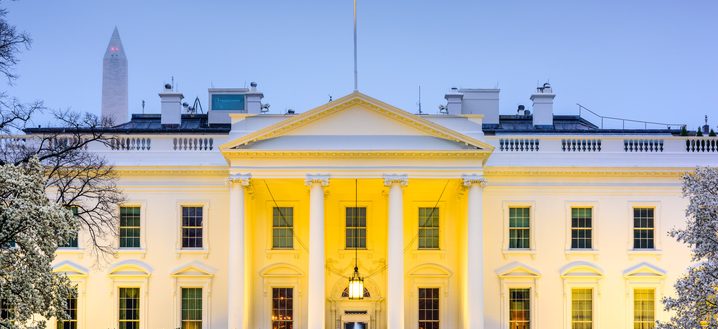GovLoop spoke with Brian DeWyngaert, Chief of Staff for the American Federation of Government Employees (AFGE), to gauge what federal employees should know heading into a unique election cycle. AFGE represents 700,000 federal employees, the largest share of U.S. public servants represented by any union.
None of this is normal. The U.S. could be on the precipice of its first contested election since 2000, given doubts sowed about the legitimacy of this year’s count – especially as mail-in ballots in key states could decide the election after Nov. 3.
But as opposed to 2000, Americans might be forced to go to sleep on election night with no idea which candidate won several swing states that would push them over the 270-vote Electoral College threshold.
From there, numerous scenarios could play out – leaning in favor of President Donald Trump or former Vice President Joe Biden. And what all of this means for federal employees is far different than in 2000, or in any election beforehand. Between the election, the COVID-19 pandemic and a looming Dec. 11 expiration date for the federal budget, government operations could get messy for employees.
“They’re employees who love their work, love the mission, and they’re going to make sure that the government functions, regardless of whatever chaos may be happening around them – if it’s a normal chaos,” said Brian DeWyngaert, Chief of Staff for the American Federation of Government Employees (AFGE), the largest federal employee union. “If something goes beyond that, then as Americans, we’ll all kind of be in a new world.”
Axios reported that Trump could claim victory Tuesday night if it “appears” he’s ahead, though many closely contested states will not be able to count all ballots by the close of the night, as state laws prohibit them from counting mail-in ballots before Election Day. On Sunday evening, Trump denied that he would claim victory prematurely.
Pennsylvania Gov. Tom Wolfe has said his state “probably won’t know results on election night,” as many experts forecast it as the potential tipping-point state. Similarly, Michigan Secretary of State Jocelyn Benson announced that Michigan might not count all votes until Friday, Nov. 6. Mail-in ballots generally have to be postmarked on or by Nov. 3 to count, but specifics vary state by state. Concerns about whether a delay in official tallies could lead to unrest or uncertainty have cloaked the process in doubt.
What all this shapes up for is an ugly government work environment in the immediate aftermath of the election, with a few possible situations at play.
If Biden were to win, and Trump were to accept the results, DeWyngaert and others worry that the administration would try to ram through policies and construct roadblocks to a smooth transition of power. Ordinarily, transition teams from both the outgoing and incoming administrations work to ensure continuity of operations within agencies in preparation for a shift in priorities.
The Trump administration has already put transition teams in place, as reported by as reported by CNN and Politico. According to The Atlantic, the transition process is going “smoothly” and as planned.
The Partnership for Public Service – a nonpartisan, nonprofit organization that provides resources for effective government – maintains a Center for Presidential Transition. The center offers resources for agencies, prospective appointees and transition teams for when handoffs of power do occur. One recent article noted that “burrowing in” political appointees as civil servants, to closely watch or interfere with new presidential priorities, has been common practice under all recent administrations.
But because the potential delay for results and heated contest of votes, if transition teams are needed, the process could be much more fractious. That’s something AFGE is considering.
“Generally, transfers from one administration to another have been cooperative. But this is a very different administration. I’ve not seen one like this before,” said DeWyngaert, who’s been working at AFGE since 1978.
There isn’t a clear precedent here – at least not recently. In the 2000 presidential election, a disputed outcome between President George W. Bush and Democratic candidate Al Gore, President Bill Clinton’s administration had already reached the end of its two terms. Though the fight in the Supreme Court over who won the election might have hampered the transition, the administration was already prepared to leave office.
One of the worries for federal employees is another government shutdown, which could leave hundreds of thousands furloughed or working without pay temporarily. Following the previous shutdown in early 2019, Congress passed a bill guaranteeing backpay to federal employees whose pay is suspended during shutdowns.
In the case of a contested election, DeWyngaert worries Congress would be less likely to progress with talks on the budget, which runs out Dec. 11. Instead, all attention would turn to who the rightful president is.
A contested election could occur if Trump comes out of Election Day with the lead, but Biden pulls ahead in voting tallies in subsequent days or weeks. Courts could have to step in, under this scenario, which experts have forecasted given Biden supporters’ higher propensity to vote by mail.
“All bets are off,” DeWyngaert said.
Facing a potential budgetary impasse, DeWyngaert said AFGE will publicize the adverse impacts of government shutdowns. Right now though, that’s not even something that many federal employees have top of mind, he said. Like everyone else, they’re mainly worried about COVID-19.
Yet amid so much uncertainty, DeWyngaert said Americans can take heart in the consistency of the civil service. Regardless of who’s at the top, government employees are the drivers of important public missions day after day, he said.
“Federal employees know what the job is,” DeWyngaert said. “They’re committed to the mission, and they’ll deliver.”
